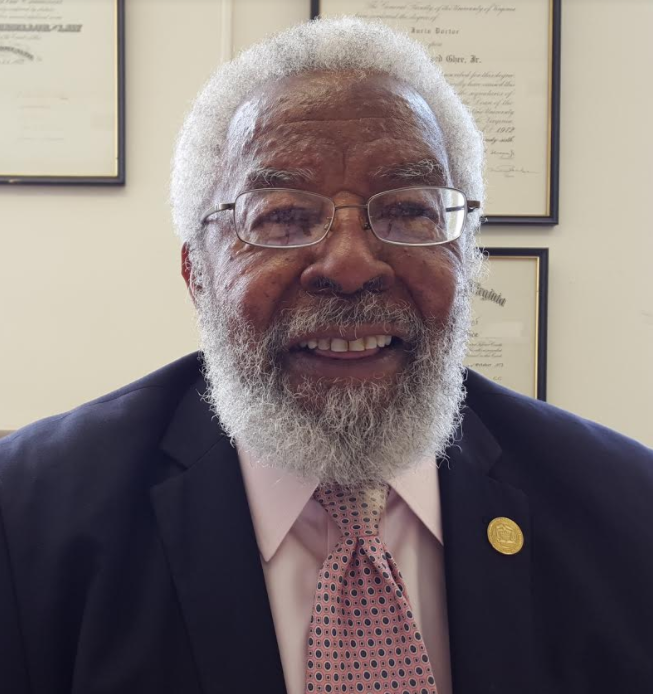
Our lives are often changed by those who we may not know, but whose willingness, in the words of Common and Andra Day’s song “Stand Up for Something”, have a huge impact on us. The man we honor, James Ghee, did not know Barbara Johns, but her stand certainly had an impact on his life.
James was six years old when sixteen year old Barbara Johns led the walkout at Robert Russa Moton High School in Farmville, Virginia. He was the third child of James and Mary Ghee, also of Farmville. Farmville is seated on the banks of the Appomattox River, in central Virginia, just 20 miles upstream from where Lee surrendered to Grant. Like a lot of the Commonwealth, there’s a lot of charm, and a great deal of history; some good and some evil. Farmville’s story highlights one of the ugliest chapters in the history of Virginia and America — the era of segregation — but also brings hope and promise. As James Ghee said as he reflected on that history and his home town, “it’s unbelievable that the Town of Farmville could overcome so much history and be prepared to conduct a Vice Presidential Debate. Amazing.”
In 1951, Farmville’s all-black Moton High School was so underfunded that there were parts of the building without a full roof; it was so dilapidated that rain fell on the students while they were trying to learn. To protest those conditions, Barbara Johns organized a walkout. That walkout became part of a lawsuit (Davis et al. v. County School Board of Prince Edward County) that was later joined with the historic Brown vs. Board of Education of Topeka lawsuit. In its landmark Brown decision in 1954, the Supreme Court declared that “separate educational facilities are inherently unequal”. That critical victory for the civil rights movement began to change America forever.
However, that change was met with resistance, “Massive Resistance” as it was named in Virginia. Led by U.S. Senator Harry F. Byrd, Sr., the Byrd political machine plotted all kinds of ways to impede and block integration. It got so bad that the Prince Edward County Board of Supervisors took the extreme step of refusing to appropriate any money for the school system, thus shutting their schools down for 5 years.
It was an ugly time. All public schools were closed and a private school, the Prince Edward Academy, opened its door for the white students whose families could afford the tuition.
While Prince Edward County was making national headlines for its refusal to open its public schools, non-profit organizations were doing their best to help young African-Americans that found themselves with no opportunity at an education. James Ghee was one of them, one of 66 students placed in families across the country by the American Friends Service Committee, a Quaker organization. James graduated from high school in Iowa City, Iowa and graduated with honors from the University of Iowa.
Despite being thousands of miles from family and friends and the only world he had known, James rose to the challenge, excelled in school and then returned home to the Commonwealth and graduated from the University of Virginia School of Law.
It only seemed right that James would start his legal career by signing on with the civil rights firm of Hill, Tucker and Marsh in Richmond, Virginia. After all, the firm’s founding partners, Oliver Hill and Spottswood Robinson, had been convinced by Barbara Johns and her fellow students to take up their cause and represent them in Davis v. County School Board of Prince Edward County lawsuit.
But home was calling and James returned there in 1975, becoming the first practicing African American attorney in the same locality that had once refused to grant him an education.
Over the decades James became an icon in the community: founding the Virginia Legal Aid Society; serving as an active member of the Virginia State NAACP and Parliamentarian of the National NAACP; helping start the Moton Historical Society which negotiated and bought the Moton School from Prince Edward County; and serving as a role model as a devout churchgoer and Sunday school teacher, political adviser, and leader.
When I asked James where he thought we were now in Virginia and as a country, he gave this powerful and thoughtful reflection, “Charlottesville was a modern day version of Dr. King’s ‘Letter from Birmingham Jail’. It was a clarion call that white America was allowing skinheads to decide what defined American patriotism. It was a lesson we must take heed of.”
As I noted, our lives are often made better by those we do not know; in this case, my life, is better because of a man I am blessed to know — James Ghee. On behalf of the Democratic Party of Virginia, we honor him and his continuing work. Thank you, James.
To read article on Medium, click HERE